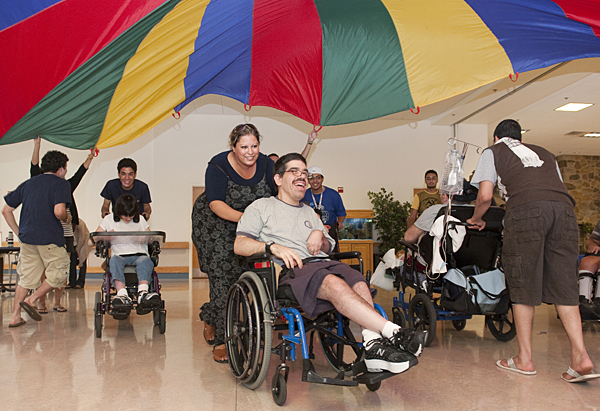
State Department selects UD
MEPI program at UD to welcome students from 14 countries
10:07 a.m., June 3, 2011--Meriem Meziri, a student from Annaba, Algeria, “fell in love with Delaware” as a participant in the U.S. State Department’s Middle East Partnership Initiative (MEPI) program last summer at the University of Delaware.
Meziri will long remember her “amazing” teachers and classes, the campus, and the state’s emerald-like qualities of being “beautiful, green and small.”
Global Stories
Fulbright awards
Peace Corps plans
This summer, UD will introduce more students like Meziri, from 14 countries in the Middle East and North Africa, to American culture. The U.S. Department of State has selected the University to host the MEPI Student Leaders Program for the eighth year running, plus a new workshop for MEPI alumni focusing on persuasive communication skills.
UD’s Institute for Global Studies (IGS) will coordinate both programs, which are funded by the State Department’s Bureau of Near Eastern Affairs.
Creating vibrant partnerships that foster the development of “pluralistic, participatory and prosperous societies” throughout the Middle East and North Africa lies at the heart of the MEPI program, according to IGS Director Lesa Griffiths.
“MEPI provides a unique opportunity for students to develop their leadership and civic engagement skills, with a specific emphasis on applying those skills in their home communities and countries to effect change,” Griffiths said. “Additionally, participants learn about and discuss values, issues and institutions that have played important roles throughout U.S. history.”
Jim Magee, associate professor of political science and international relations, is faculty director of the MEPI student leaders program, and Audrey Helfman, associate professor, is the program’s leadership director. Participating faculty include Gretchen Bauer and Muqtedar Kahn, political science and international relations; Jim O’Neill, economics; Alan Fox, philosophy; Ralph Begleiter, communication; and Carolyn Bitzer, women’s studies.
The program not only helps students from the Middle East and North Africa gain more effective leadership skills and a more realistic understanding and appreciation of American norms and institutions, Magee said, but it also helps the many Americans with whom the participants interact in overcoming stereotypes of Arabs.
“Both hosts and visitors eventually recognize greater commonalities than differences in their hopes and aspirations,” Magee noted. “Since the very first MEPI program, the Institute for Global Studies, under Lesa Griffiths’ leadership, has built a growing network of MEPI alumni and American participants who keep in touch with each other. In Arab capitals and even in remote villages, there are MEPI alumni--and their families--with a deep affection for and a yearning to return to UD and Newark, Delaware.”
Tracey Holden, professor of communication, is the academic director of the new professional development workshop to help MEPI alumni enhance their oral and written persuasive communication skills. A range of theories and contexts for public persuasion will be analyzed and communication practices discussed as they relate to political, social and cultural issues. Participants will apply their knowledge in a major program project and individual presentations.
Participating faculty include Dannagal Young, Lindsay Hoffman, Lydia Timmins, Sandra French and Carolyn Bartoo, all from communicaton; Ikram Masmoudi, foreign languages and literatures, who will speak about Arabic language, culture and persuasion; and Muqtedar Khan, who will share his persuasive writing experience. Sandra French, from Radford University, will offer her expertise in organizational communication, and Angana Shah of Washington, D.C., will share her experience as a lawyer working in international development.
“In our interconnected global society, effective communication skills are essential,” Holden said. “Our workshop brings together a unique faculty with specific subject matter expertise focused on the persuasive communication practices most in demand and most readily applicable in today’s world. I appreciate the extraordinary support we’ve received for this program and am very proud of what we've designed for our participants. I am looking forward to an intense and productive program.”








